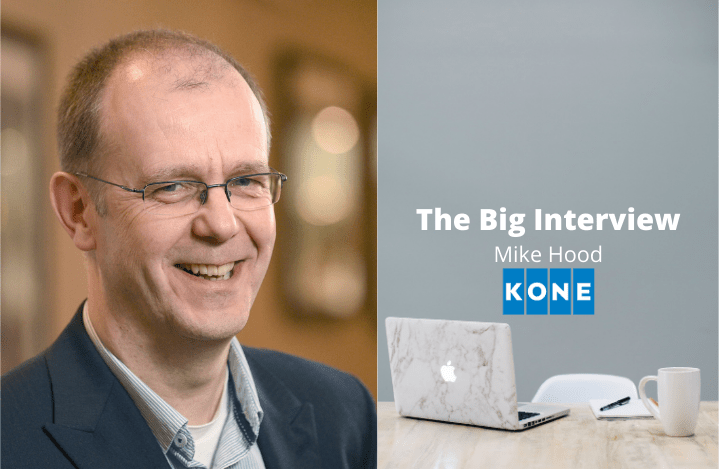Rosie Jenkins spoke with HR Director Mike Hood from Kone, a global leader in the elevator and escalator industry, to hear about his career and what advice he'd give aspiring HR Directors.
Your ‘day job’ is HR Director. How did you get into HR? Have you specialised along the way? What do you love (are you most passionate) about being an HR Director?
My whole career has been in HR and I started as a graduate trainee in what was then British Steel. That gave me a great generalist grounding but also an early exposure to employee relations given the nature of the steel industry and how change was managed in it.
I’ve mainly held generalist roles but have held specialist positions in talent management and ER along the way.
I think the ability to step into a specialist discipline at some point in your career is a great way to master depth. I always come back to a generalist role as that’s where you can bring together all of the elements of a people strategy and that’s what motivates me.
I initially took an HR role as I thought I had some insight into what drives behaviour, that’s become a deep interest in how to align individual and organisational goals.
What challenges are you and the team currently facing?
The same as in many organisations today; how to keep people safe while delivering for customers, how to keep teams aligned remotely and how to give people confidence in the future.
That said some things don’t change and remain important whatever the external environment; building the people skills of line managers, attracting and retaining talent and building leadership succession.
How has Covid-19 changed your role as HRD? What lies ahead (trends, topics) for you in the next 6-12 months?
For all of us in HR roles, Covid has meant quickly adjusting to new ways of operating and help our organizations respond to uncertainty. Covid has undoubtedly put HR in the spotlight and allowed us to demonstrate both an understanding of our businesses and influencing how they cope with the crisis.
I think the next six months will be shaped by how we reintegrate people into offices – the genie is out of the bottle on flexible working and I can’t see us going back to five days a week in an office as the norm.
Equally, our frontline people have continued to work as normal throughout the Covid crisis and we need to think about their expectations for the future.
Wellbeing will also remain an organisational priority.
Finally, I think organisations will need to spend much more time connecting people and their roles to purpose – I see this as an important part of refocusing organizations post-Covid.
ED&I is hot on the HR agenda at present, what actions have you taken around this topic?
A large part of Kone‘s business is in the construction industry and that has traditionally had very limited diversity. Like other employers, we are trying to change that.
We started by articulating a clear business case for diversity and inclusion and running workshops for line managers to engage them in the case for change.
We have established networks that give voice to minorities in our workforce and this has enabled a rich dialogue on what we can do to build an inclusive environment. We have consciously changed how and where we recruit to attract diverse candidates.
What impact has the use of technology had (the fourth industrial revolution) on how you deliver HR to the business?
I’m going to be a contrarian on this one – I think the impact of technology on HR delivery is overstated currently.
Yes, most of us have robust systems that house our data and integrate performance management, reward and talent management. And yes, these enable line manager and employee self-service.
We have automation but I’m not sure we are getting seeing a great deal of added value from our mountains of data yet. That’s going to take the commercialisation of AI tools.
What would you change within the benefit of hindsight?
Brexit!
OK, assuming it was a personal reflection you were looking for that’s actually a tough question.
I’ve made a couple of role decisions that haven’t worked out as well as I had hoped but I think that’s inevitable.
Every career is a mixture of hard work and good luck. I think it’s important to be clear on your goals and do your due diligence well when looking at moving organisations.
But, on balance, on I’m happy with the decisions I have made and grateful for the opportunities I have been given.
What advice would you give an aspiring HRD?
When you are appointed to an HRD role, your HR functional skills and knowledge will be taken as a given, they are just the entry stakes.
What you will need to demonstrate is an understanding of the business context and how people plans can help the business achieve its strategic goals.
So try not to get stuck in the day to day tactical stuff and spend time understanding the business and how HR delivery can make a difference. It will be your business savvy and your interpersonal skills that enable success.


